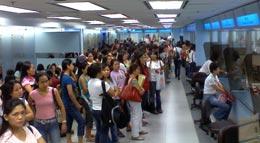Philippines has sent fewer maids abroad this year

The Philippines has sent fewer maids abroad this year in what Manila says is proof that labour curbs meant to protect a sector "prone to abuses" are working.
Data released by the Philippine labour ministry showed that 55,961 went abroad from January to May, 20 per cent fewer than the 70,034 posted a year earlier.
There are more than 1.5 million Filipino maids working abroad. With about 100,000 Filipinos living in the Lower Mainland of British Columbia, roughly 25,000 are working as caregivers and domestic workers,
Prior to the drop, the number of Filipino maids processed for jobs outside the Philippines had more than doubled from 71,557 in 2009 to 164,396 in 2013, according to the latest available data on the website of the Philippine Overseas Employment Administration (POEA).
According to the POEA, Saudi Arabia employed 20,949 domestic workers in 2015 compared to 26,570 in 2014; United Arab Emirates had only 215 household service workers this year from 13,440 last year, while Hong Kong recorded 5,825 domestic workers from to 8,409.
Statistics in Singapore (3,798 from 4,853), Bahrain (1,982 from 2,029), Malaysia (1,725 from 4,179), Cyprus (322 from 424), Brunei (147 from 273), and Macau (75 from 143) also went down for the first five months of 2015 compared to the same period in 2014.
The latest numbers show that Manila's "relentless" reforms to ensure maids get at least US$400 (S$562) a month without paying placement fees are working, said Labour Minister Rosalinda Baldoz.
The Philippines stopped sending its women to the United Arab Emirates (UAE) in June last year after the government refused to recognise contracts guaranteeing Filipino maids the minimum pay of US$400 a month.
Only 215 Filipinas were deployed to the UAE from January to May from 13,440 a year earlier.
It was not explained how the maids made it to the UAE despite the ban. But earlier reports said there is now a thriving black market for maids in the emirates because of the Philippine ban.
Manila has been reining in on maid deployment as abuses remain a concern. Last year, photos of a 23-year-old Filipina in Saudi Arabia with burns on her back, arms and legs appeared on Facebook.
In a 2013 survey by the Mission for Migrant Workers of some 3,000 maids in Hong Kong, one in five said she has been beaten by her employers. More than half said they have been verbally abused, and 6 per cent claimed to have been molested.
Recruitment firms say the 20 per cent drop was a result of Manila's heavy-handed policies, coupled with an inept bureaucracy.
A coalition of recruiters and travel agencies earlier called for an industry-wide rally to protest against what they saw as the unreasonable implementation of rules.
Regulators had been suspending or cancelling licences without public hearings, the group said.
"Sometimes, preventive suspensions are dished out based only on a Facebook post or an unverified news report," said recruitment consultant Emmanuel Geslani.
The POEA has already cancelled the licences of at least 280 recruiters since 2012, he added.
Geslani said glitches in passport-processing had also been a big problem. It takes a maid at least two months to get a passport, he added.
The foreign ministry has admitted that its passport backlog ballooned to 42,230, forcing it to extend expiring passports for at least a year.
Mr Geslani added that the 20 per cent drop "means over 14,000 did not get jobs and are now jobless". Central bank data shows that remittances from more than 10 million Filipinos abroad - a major economic engine for the country - dipped in January-May this year.
Remittances grew on average 5.4 per cent, compared with 6 per cent a year earlier and 7 per cent in the years after the 2008 financial crisis.
In his State of the Nation address earlier this month, President Benigno Aquino said fewer Filipinos are leaving the Philippines as robust growth under his term has been creating jobs offering competitive salaries.






